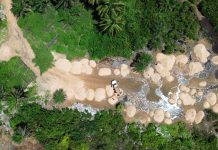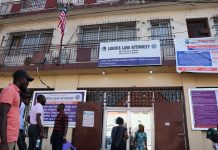Top: People at a canoe landing in Greenville, Sinoe County in 2023. One of the canoes, marked “The Lord is my Shepherd,” transports timber to Buchanan. There, the timber are uploaded to a larger canoe to Ghana. The DayLight/James Harding Giahyue
By Emmanuel Sherman
BIG FANTI TOWN, Grand Bassa – Planks are scattered at various sites on a beachfront, a stone’s throw away from the Port of Buchanan, a fishing hub and a transit point for fishermen and fishmongers. Some are old, others fresh.
The wood are leftover of timber smuggling that involves fishermen. Fisherpersons, canoeists, villagers and businesspeople in Sinoe, Grand Bassa and River Cess confirmed that fishermen used canoes to smuggle timber predominantly to Ghana. Smugglers, aided by villagers and artisanal loggers, paid Fanti fishermen to transport wood, including to other countries, a DayLight investigation found.
“All the canoes can bring the planks, they can carry them to Ghana,” said John Kwakue, a Ghanaian fisherman who lives in the Buchanan fishing community of Fanti Town.
“I saw it for the first time in 2014 and I did a little bit before but I am doing something else now,” added Kwakue.
Kojo Ittah, another Ghanaian fisherman and a 15-year Fanti Town resident, said he had witnessed the smuggling on several occasions. “Last year, we went fishing, and I saw the canoe carrying [the timber] to Ghana. They are not just sticks. They are the fat, short planks, heavy and thick,” Ittah said.
Ittah’s description matched banned timber blocks that are prone to smuggling. However, until now, canoes had not been known to be used in illicit timber trafficking—at least not publicly.
Ittah’s story was corroborated by James Banney, a Ghanaian owner of a canoe called Exodus; Praise Jlamontee, an ex-Fanti Town leader; and Zebedee Bowin, a businessman in Buchanan.
Bonwin disclosed that “I used the boat one or two times.” The DayLight has investigated Bonwin before for trafficking chewing sticks to Ghana amid a Liberian moratorium.
Banney, with a Ghanaian accent like Ittah and Kwakue, revealed that the timber are taken to Takoradi, Ghana’s western region. A person, who did not want to be named, spoke of ferrying wood even to Mali, Guinea and The Gambia.

Timber smuggling is bad news for Liberia, which lost 386,000 hectares of primary forest. That’s a decrease of 8.7 percent of all the country’s humid primary forest, according to Global Forest Watch, which tracks deforestation worldwide.
In 2023, the Associated Press reported that 70 percent of Liberia’s timber exports may have happened outside of the legal channel, citing diplomatic sources. Five years earlier, a report by the Switzerland-based Global Initiative Against Transnational Organized Crime had listed Liberia as one of the main West African countries for illicit logging.
‘The Lord is my shepherd’
But where in Liberia do the fishermen get the timber from? The DayLight found the answer in Sinoe, River Cess and Grand Bassa, which lost nearly a combined 500,000 hectares of tree cover in the last 22 years, according to Global Forest Watch. Tree cover loss measures the removal of any woody vegetation at least five meters tall.
Evidence we gathered showed that smugglers transferred timber to Buchanan from Sinoe, River Cess and other places in Bassa. Once on the beach, they are transferred to larger, motorized canoes for at least a six-hour voyage outside Liberia.
In Sinoe, The DayLight interviewed Lama Jalloh, a Greenville resident and a Fulani canoeist, who spoke of a canoe with the service name “The Lord is my Shepherd.” Reporters caught up with the canoe on a Greenville beach, where local fishermen confirmed its suspected smuggling activities.
“Planks and timber are sawn and brought from various parts of Sinoe, and transported to Buchanan,” said Jalloh.
A fisherman who reporters encountered at the Lord is my shepherd canoe said he was not authorized to speak. Similarly, efforts to interview truckers allegedly involved in smuggling did not materialize because service names are unofficial, making tracking their owners difficult. And reporters were unable to get any license plate number.
‘King David’
While Sinoe smugglers used ocean routes to transfer timber, their River Cess counterparts utilize the roads. Earlier in Buchanan, Banney mentioned a place called Waterside in Cestos, River Cess’ capital. Now, reporters visited the seaside community and asked locals whether it was true.
“Yes, trucks can go to the waterfront to take goods and carry them,” said Michael Juludoe, a Cestos gardener, echoing other residents’ comments. “They pack [sand], sticks and planks.”

Gathering timber in River Cess is the same as in Grand Bassa. Locals and fishermen alike identified a certain truck with the service name “King David” that hauled wood periodically. Also mentioned was another truck with the service name “Nimba Peking,” reporters spotted in a Compound Number Four town.
The DayLight tracked down the truck on the Big Fanti Town beach and Compound Number Four, where reporters videotaped villagers cutting trees.
In the footage, two men justify dealing with smugglers next to tree stumps and timber on the grass-carpeted forest floor. One of the men can be heard saying, “We have to survive.”
This story was a Community of Forest and Environmental Journalists of Liberia (CoFEJ) production.





Facebook Comments